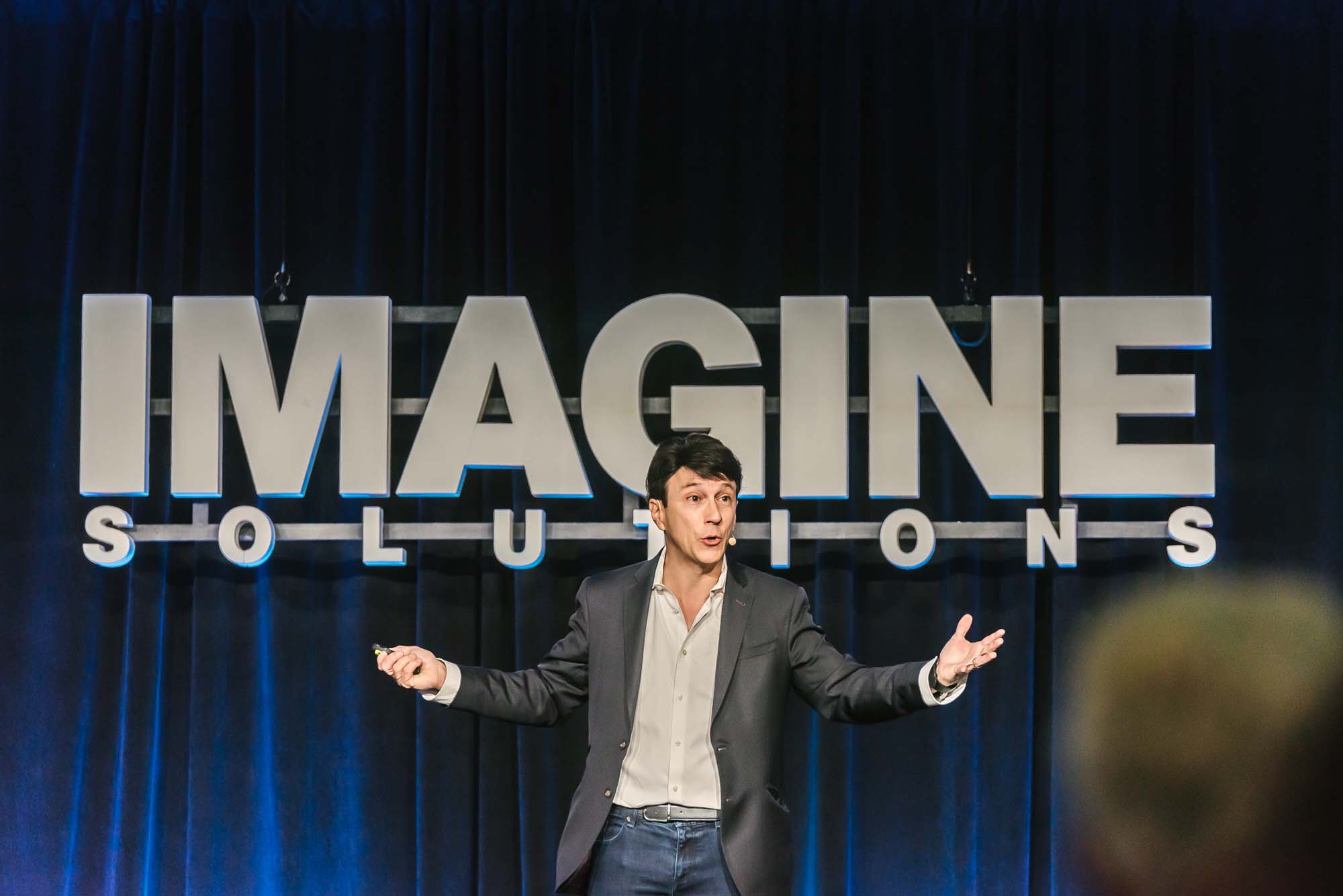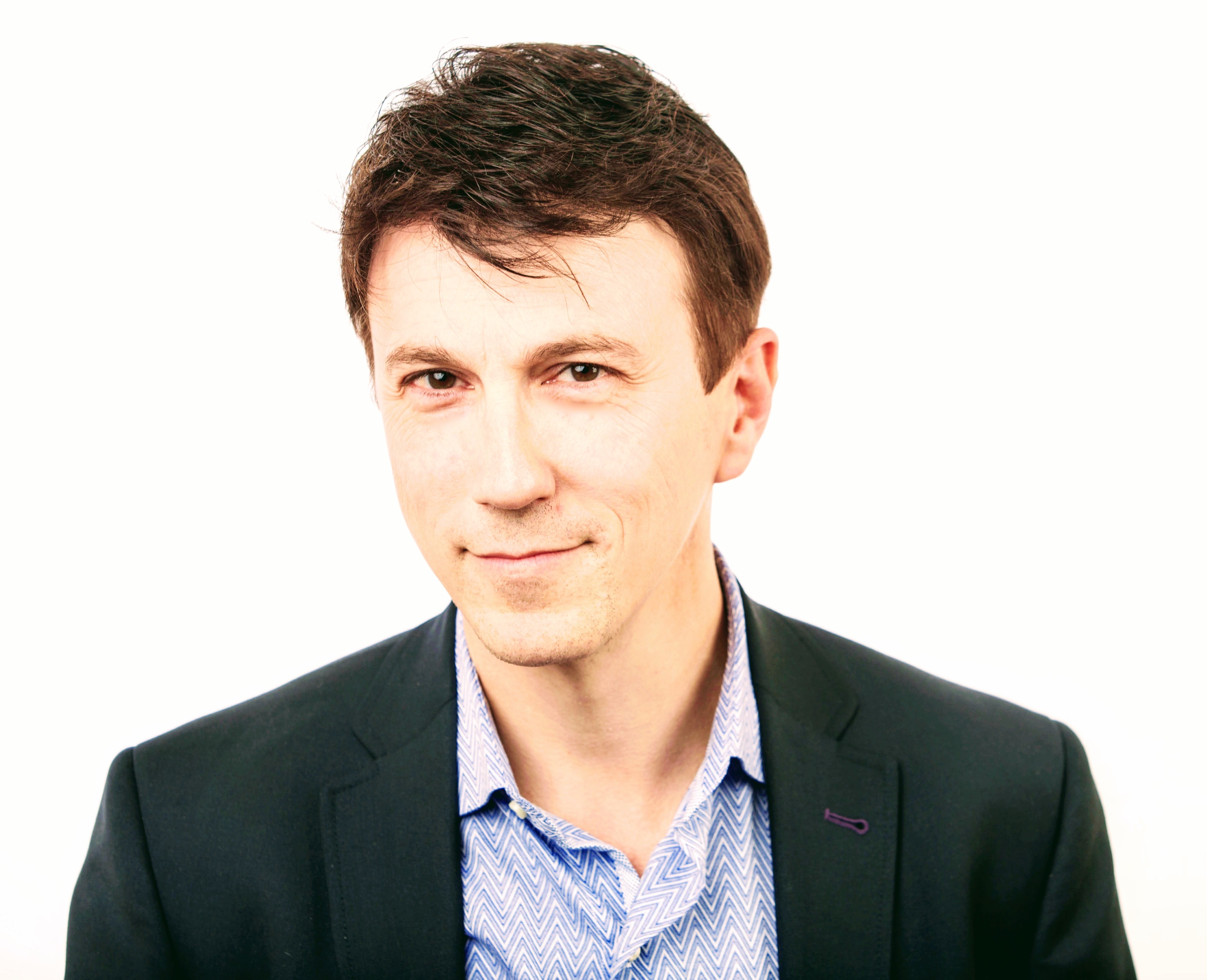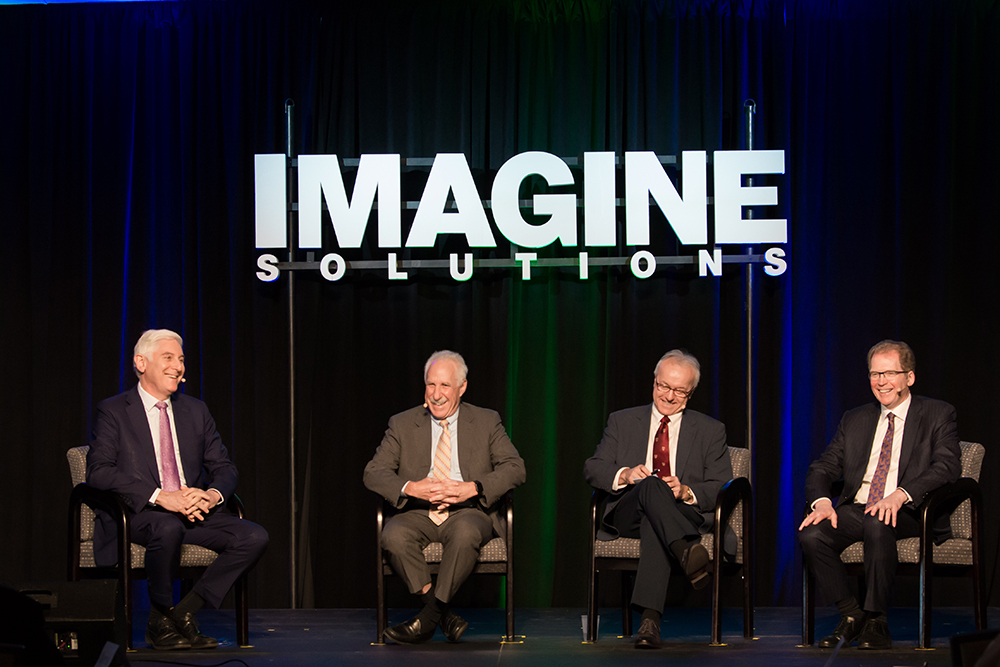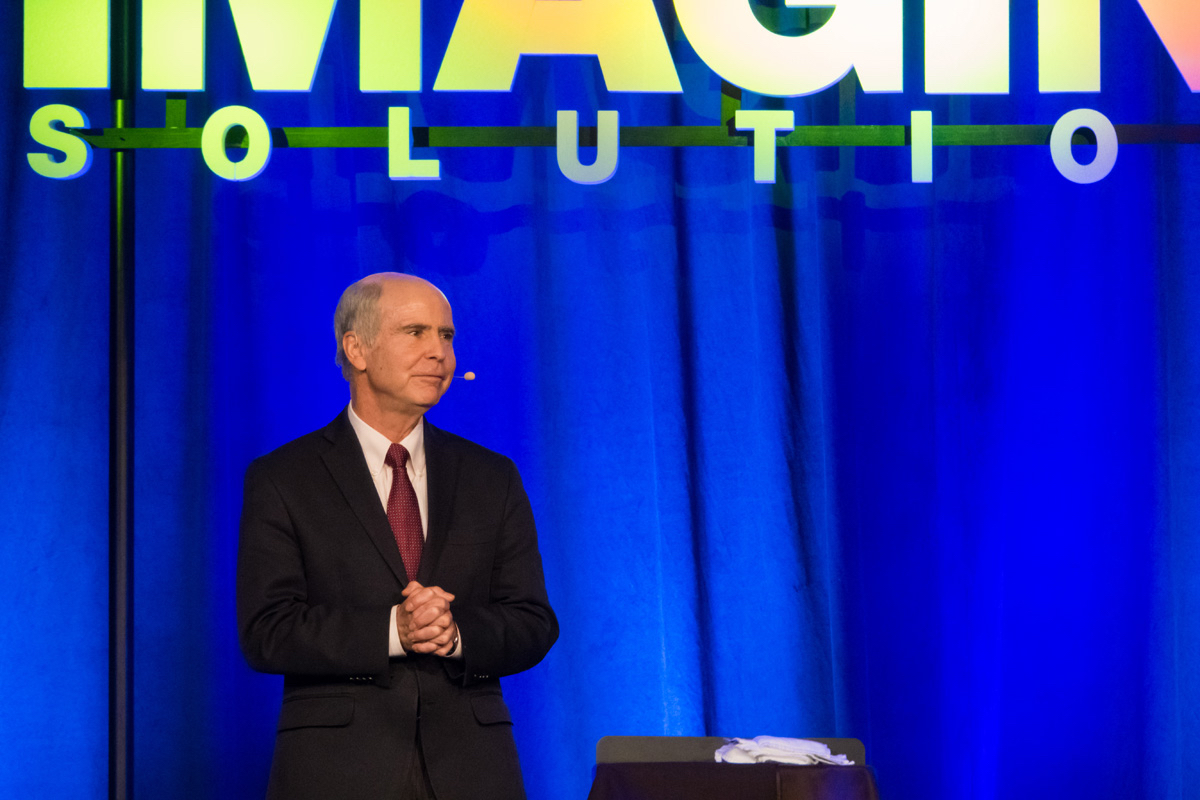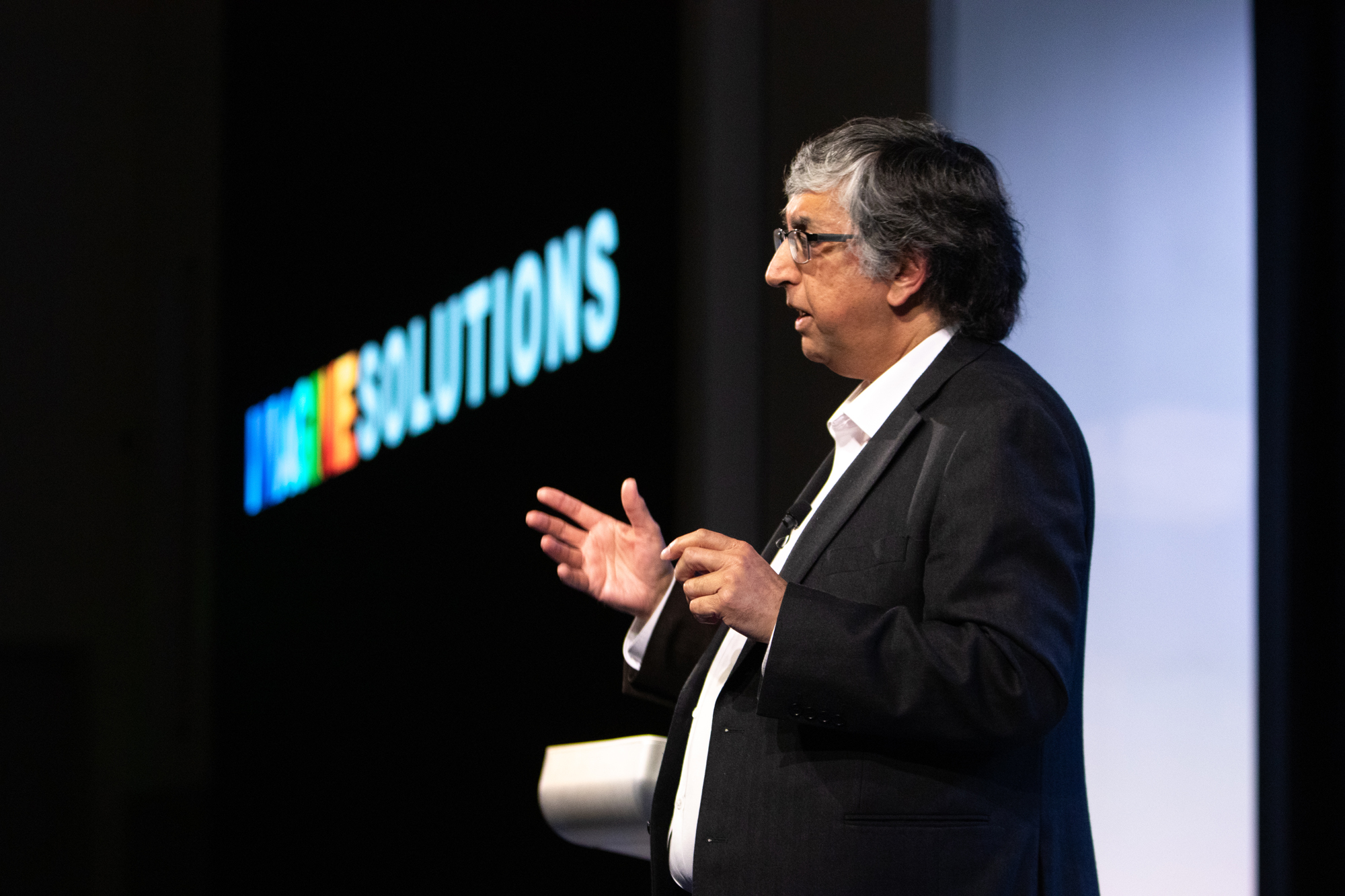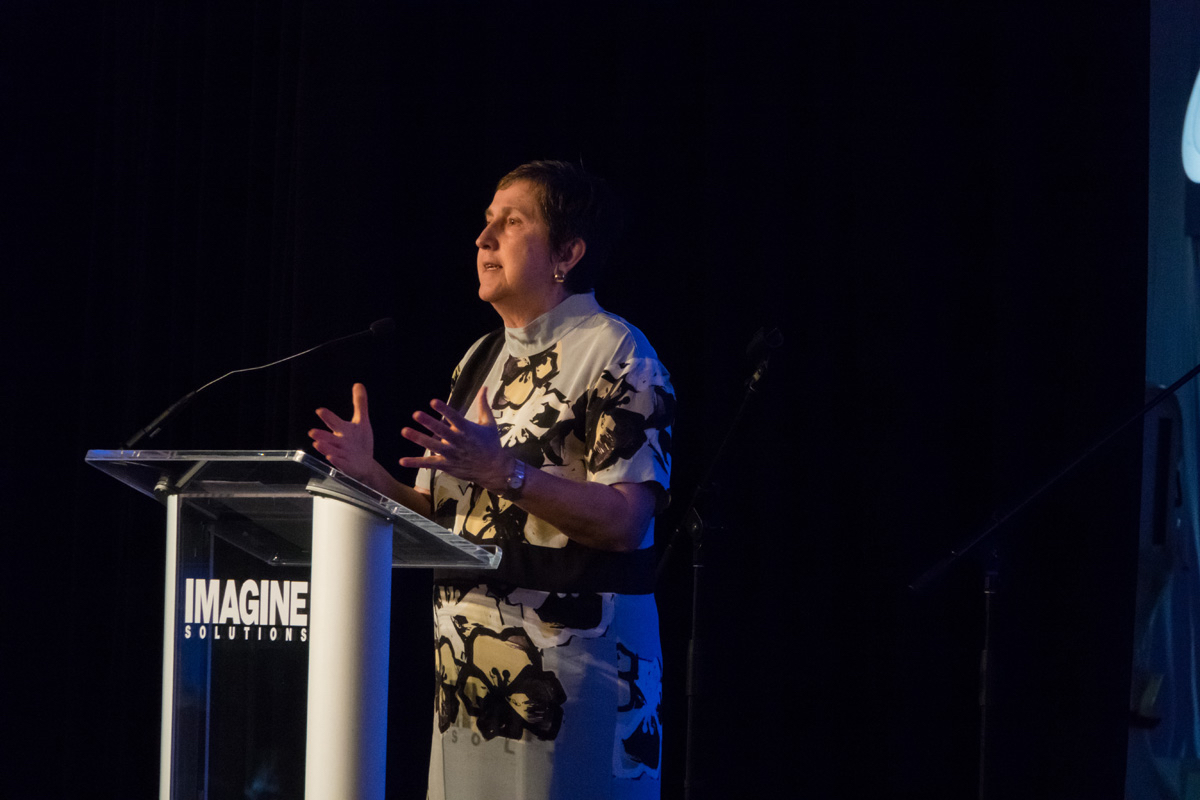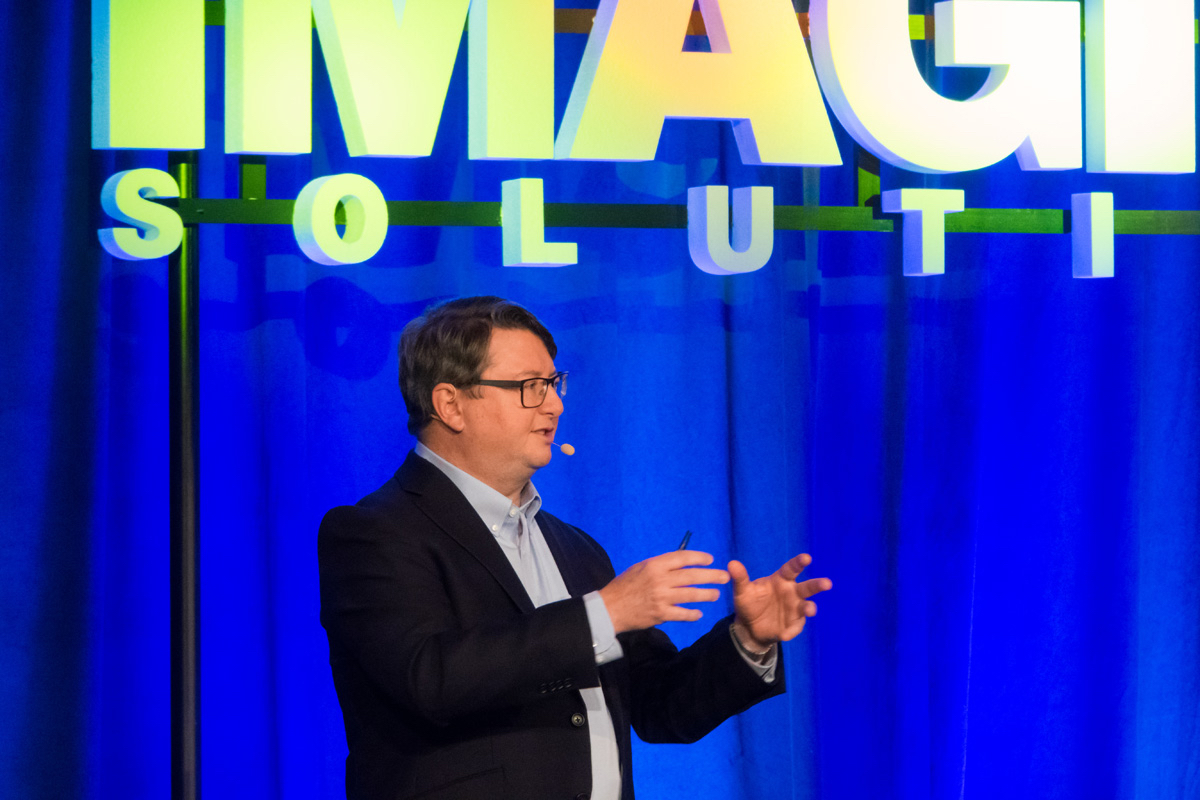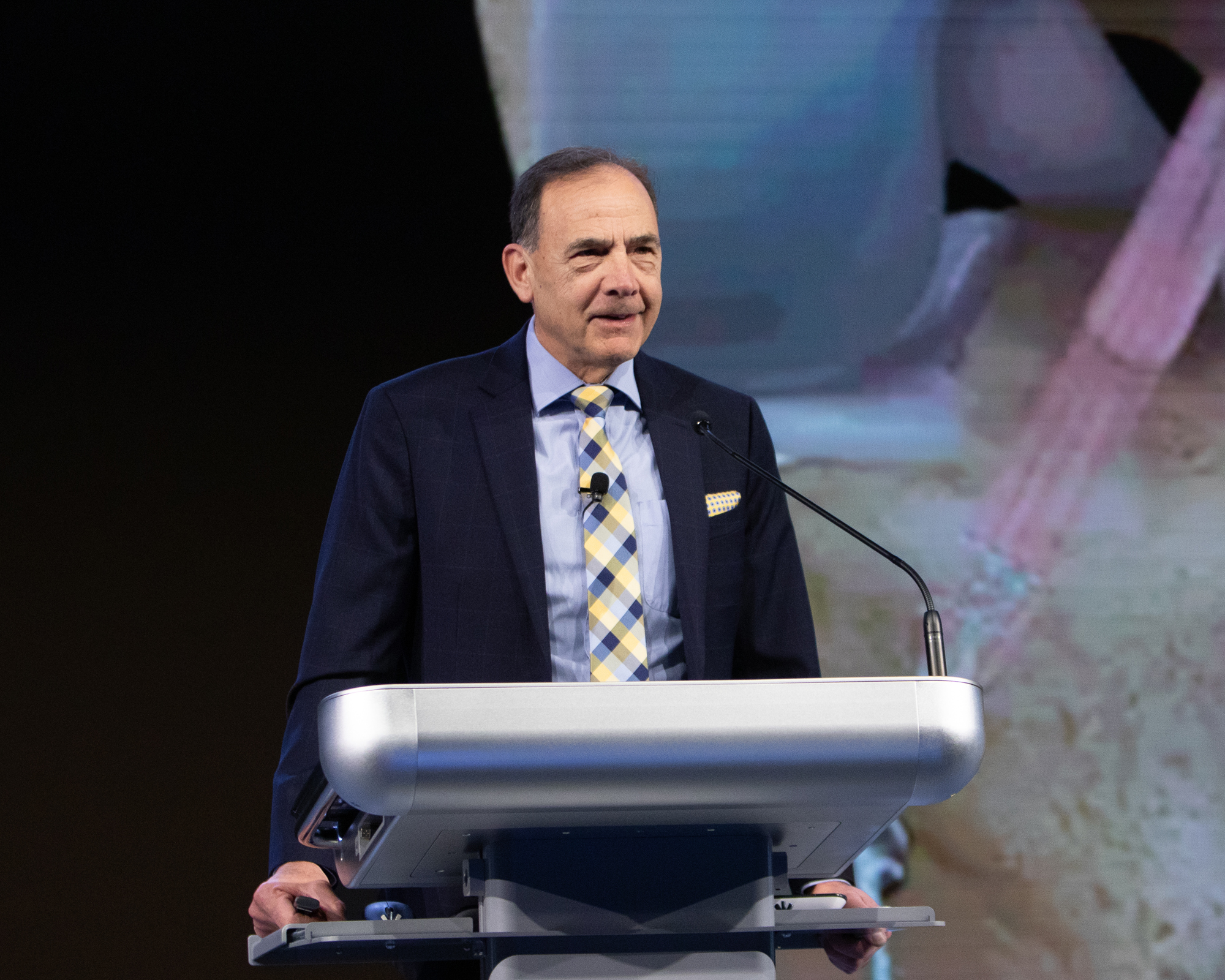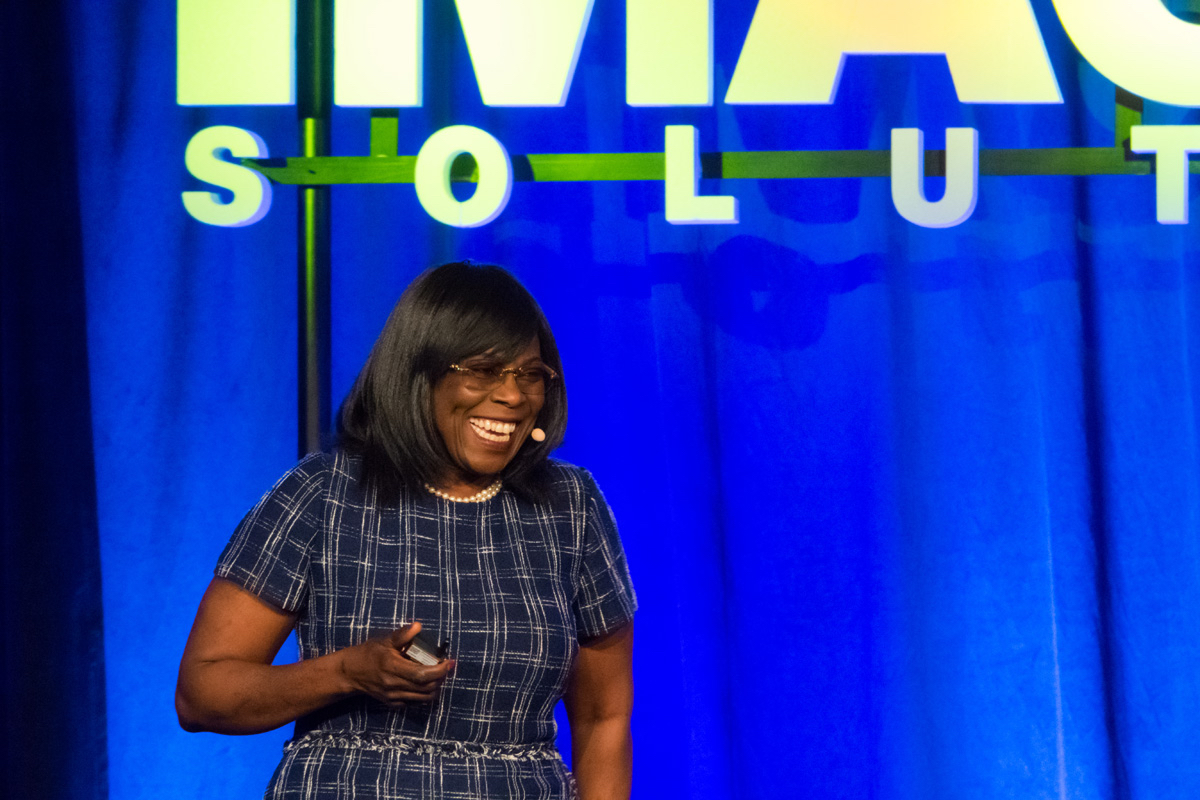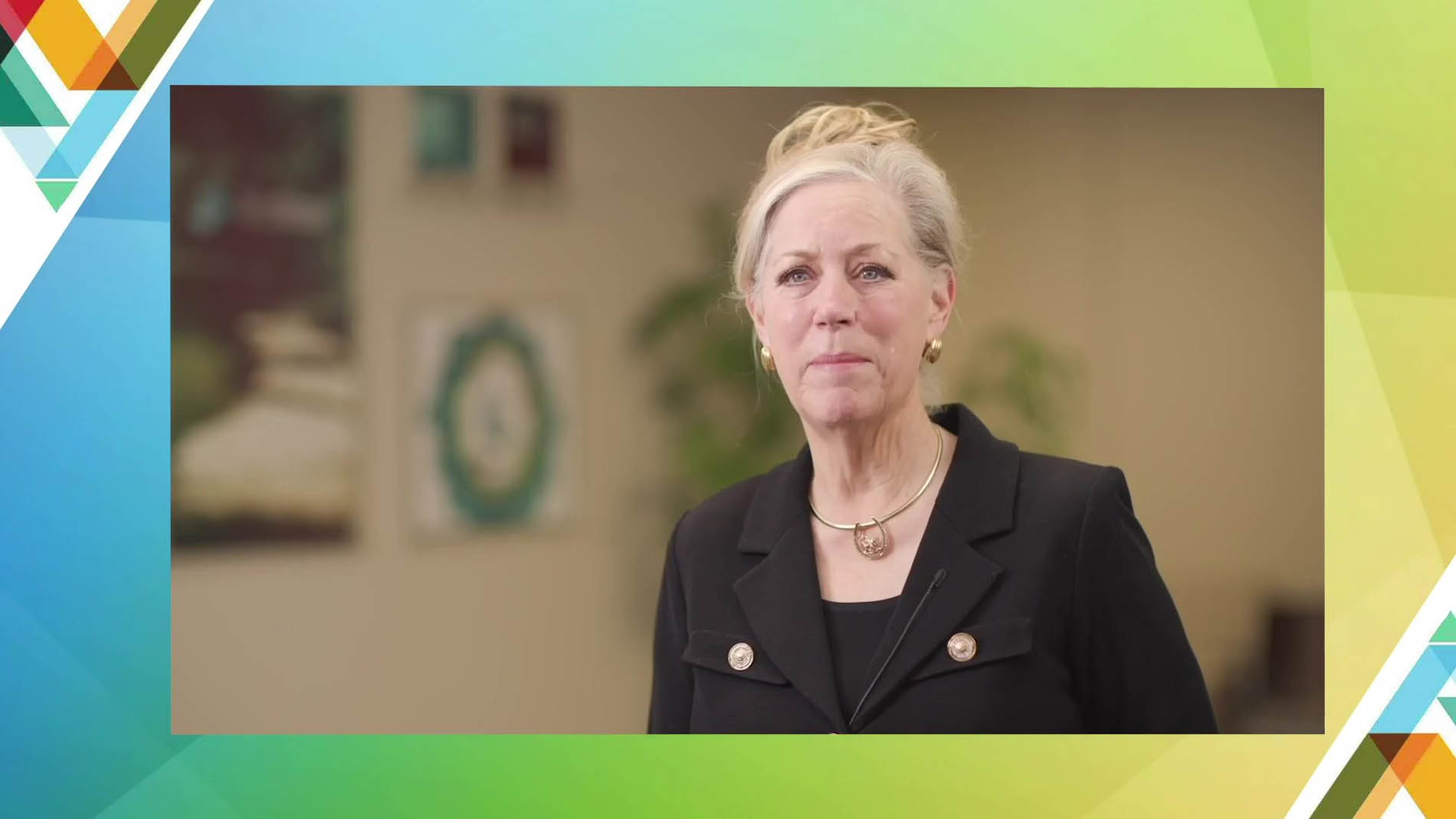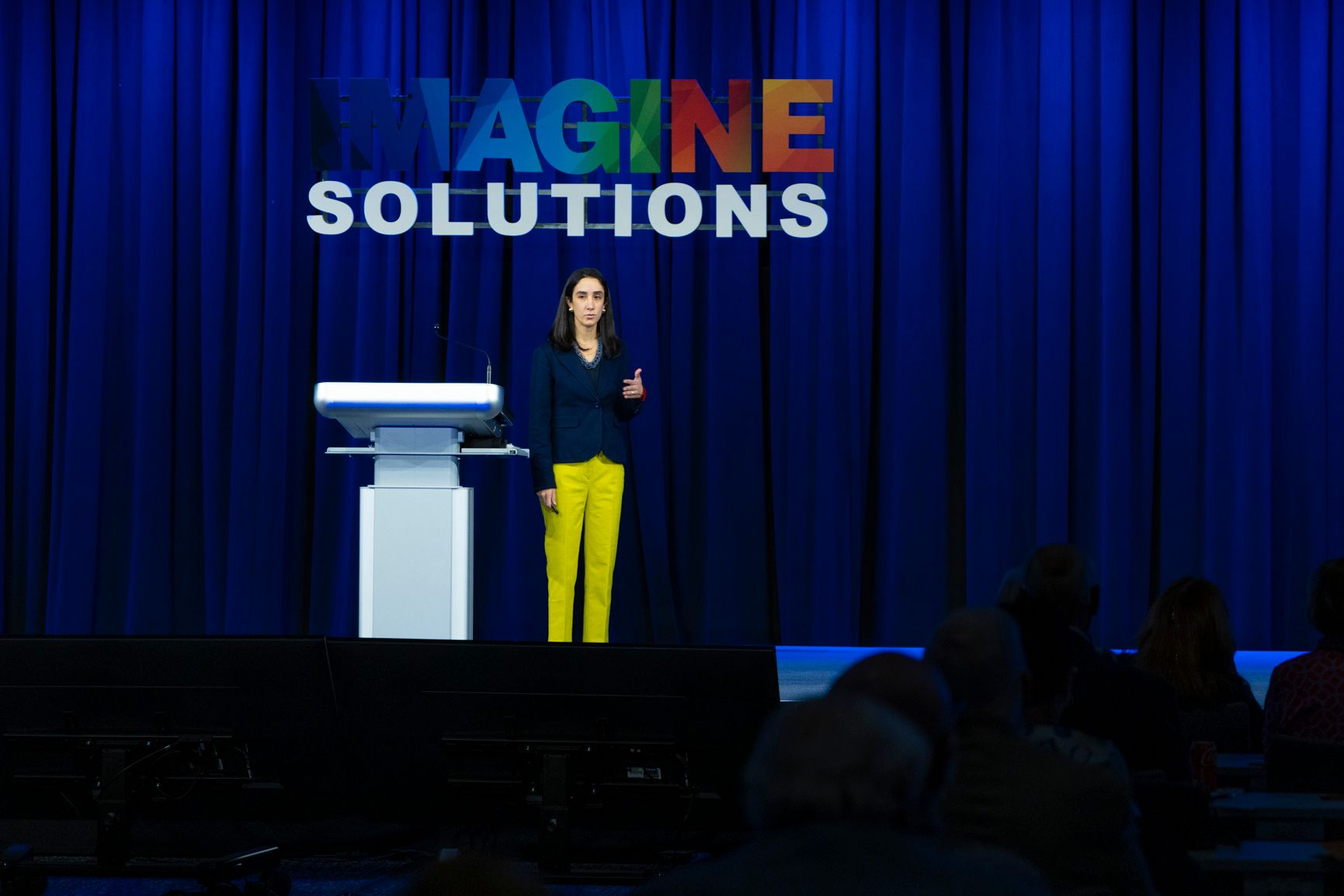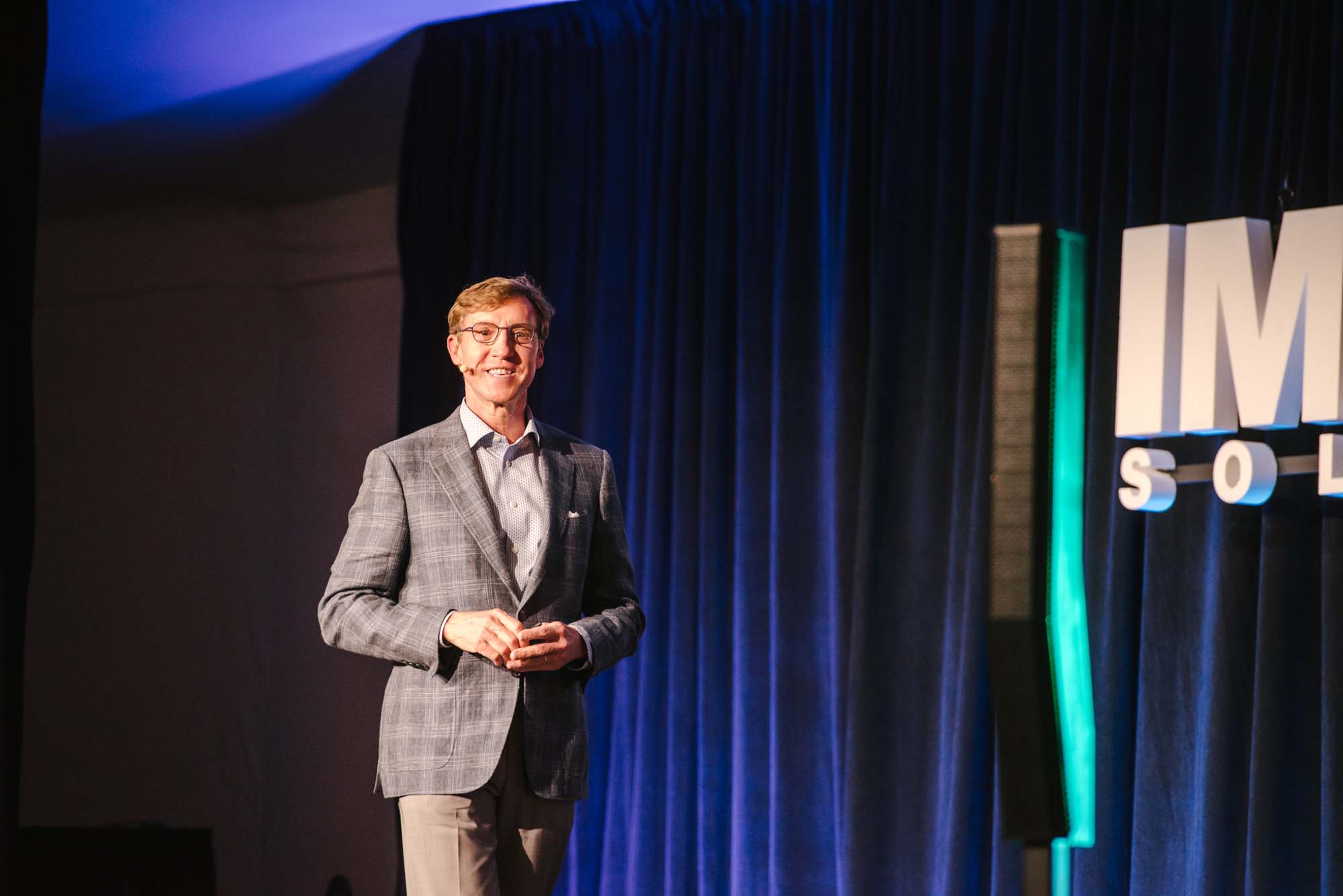Technology & Innovations Changing Medicine
Dr. Daniel Kraft looks at the landscape of health and medicine to reimagine – diagnosis; therapy; health & prevention; and using our shared knowledge to change and make your healthcare experience better.
00.00
he's a he's an amazing guy he is both a clinician and an inventor he is an entrepreneur and a visionary he has an undergraduate degree from Brown University got his medical degree from Stanford board-certified in internal medicine and pediatrics he had a Harvard residency at Mass General Boston Children's fellowships in hematology oncology bone marrow transplantation at Stanford and right now among other things he's the inventor of the marrow miner which is an fda-approved technology that goes in and gets in a minimally invasive way bone marrow which can be so life-saving for so many five TED talks and TEDMED talks and if you want to learn about what is next in medicine and healthcare take a listen to dr. Daniel craft Dan thank you [Music] good morning thanks it's great to be
01.00
here and have a chance not to just imagine to but to sort of think about reimagining health and medicine across the healthcare paradigm so I'm gonna I've got 25 minutes to cover a whole amount of really interesting elements and want to engage you to think about how you can play a role in thinking about the future of healthcare so you just heard from Regina about a lot of these amazing technologies many of which were developed at DARPA that have really reshaped our lives in many ways moving in very fast and sometimes disruptive elements and you know but a lot of those technologies have not always really translated to changes in healthcare healthcare softened a little bit stuck between the third and the fourth Industrial Age and we've reinvented how we do our banking and our movies but you know we're still using you know fax machines in healthcare I was talking to a couple the participants here who I should run hospital systems you know what's the future of the hospitals is still the four walls are we blending with more virtual care or telehealth so you know as we look to the future of medicine it's a bit helpful to have a little bit of a look back to the future it's also scary is were past the
02.00
date they went to in that movie that was like 2016 was the future I've had my own back to the future of moments as mentioned I trained at Mass General Hospital I was back there for the 200th anniversary of MGH with the guys and girls I was in the trenches with 20 years ago as a resident and you know there's some very historical historic places at Mass General where they fit to the first general anesthesia back in 1846 I can visit the ether dome it's pretty much frozen in time but I was a little bit shocked and dismayed to go visit the ward where I was an intern 20 years ago and in 20 years it was also kind of frozen in time same alarms were beeping some of the same nurses maybe some of the same patients the only difference was a young doctor was pret I was you know pushing on a computer to type notes we used to handwrite them and we're still using again fax machines to communicate a lot of our information across healthcare systems and so how do we get out of our mode of you know number two pencils and filling out forums how do we get out of our old mindsets of going to the waiting room and waiting on average of 67 minutes for a usual visit here in the US or where there are more Naples or Calcutta the
03.01
ways we've still practice health and medicine are based in old silos old ways of thinking and our opportunity in terms of re-imagination is to break out of those silos not thinking about health zees by a bucket of body parts you know we're now in the genomics age just to rethink and reimagine across the spectrum and part of that is mindset you know we don't we practice health care today we practice sick care what do I mean by sick here we're all sick care model it's based on our very intermittent episodic data when you go see your doctor and you get your EKG or labs maybe you have had high blood pressure and you're scribbling your blood pressure and faxing it or email again in to your doctor or nurse where they want to see it or not so intermittent episodic data leads to are very reactive secure system we tend to wait for the patient show up with a heart attack or a stroke or in my world of oncology often late stage cancers and our potential with a lot of the technologies from DARPA nets Internet's Internet of Things and beyond is to become much more continuous than for information much more proactive personalized and to bring care anytime anywhere arguably it even lower cost and
04.02
not just to think about moving the needle on disease but to think about optimizing our our health and wellness many of us want to live long healthy lives it's not just about gears its its health span and I come from California a lot of people living interesting living forever which is very long time we're seeing a whole new industry grew up wrong longevity maybe even reversing the biologic clock the bottom line I think we really have the opportunity to change things up while we spend the most per capita in the US for healthcare we're doing much worse than many other countries in terms of outcomes so we really do need to reimagine health and medicine across the spectrum so I'm gonna kind of cover four big buckets quickly and I know I'm gonna talk fast I'll give you a phone number to text at the very end to get a copy of my slides but I want to cover where are we with health and prevention staying healthy how do we use new forms of data to be more engaged what's the future of diagnosis how do we pick up disease early rather than late therapy how can it be much more personalized and let's toss toxic toxic and how can we use all our shared knowledge and the hive mind
05.01
to all contribute to discovery that's a bit of art what we're going to cover so the future medicine it's a bit in the zeitgeist this is the cover of National Geographic last year I had the honour of reading the opening article and they kind of retitled it on me I wasn't about twelve innovations but it was about how all these innovations are coming together how we can connect the dots to reshape healthcare across that healthcare paradigm and these technologies are moving very quickly some of them are moving exponentially you already heard mentioned Moore's law the power of computing that's embedded in our supercomputers in our pocket and even found recently my iPhone - it's actually antique ten years old it still works ten years ago this is amazing now it feels you know slow and clunky compared to my iPhone eleven in ten years my iPhone 11 may be embedded in my contact lenses and feel slow so all these technologies that most of us grew up on in this exponential age of now you know dissolved into apps you don't buy a video camera or even a flashlight anymore or a map or GPS they've all become appetize and digitized and have obviously democratized how and who can get information and access almost anywhere
06.01
and so leveraging these exponential technologies we can really reshape things in the near term in the next five years in the next decade incredible opportunity now a lot of the technology that's now available through our imaginal smart devices is enabling the consumer each of us to have more transparent so you can compare one hospital down the street to another there's vitals calm a Yelp to compare doctors good rx to compare pharmacy prices if you're about to have a total knee replacement you can go to a surgical scorecard and look at individual surgeons in their complication rates so new ways to gain insights and have power of consumerization all of again again this is leveraging on our medicalized smartphones these technologies have the ability to connect not just video but new sensing they're being integrated in surprising ways for example last summer published the ability to use the microphone and the speaker and a little piece of paper to look in your child's ear and determine if they have an ear infection and what kind so on this exponential trend what used to fit on a desktop of 2000 F it's in your Apple watch and your SmartWatch is now
07.01
becoming you know FDA cleared diagnostic devices to pick up things like atrial fibrillation and of course beyond Moore's law we're moving to quantum computing which is gonna play a role in drug discovery and many other elements so things are accelerating and they're starting to ride you know 5g a hundred times the speed of 4G connecting our Internet of the body Internet of our medical things don't they connect the dots in more powerful ways now part of the challenge and opportunities for creating exponential amounts of data as well which is often very siloed and stuck on your phone or medical records that don't talk to each other so we might be able to create new knowledge but the challenge in this age is to to close the gap between the data to knowledge to information and there's still many misaligned incentives and making that happen now technology of course is great but I think most of us realize it we need to really understand the incentives as well if we're gonna move things forward because the incentives today are on the sick care side of the equation age percent of our healthcare dollars spent on already patients however advanced often chronic
08.00
disease as opposed to prevention and health and wellness and we're starting to see those shifts particularly as we change how we pay for medicine this idea of value-based care paying for you know outcomes as a new incomes and we're lucky to have here later from the founder of others thinking Michael Porter about value-based thinking as well so how do you think about technology and sentence to come together is important but we can also sometimes incentivize well-meaning ly the wrong things about 20 years ago pain was v final science of hospitals doctors health care systems were incentivized to some us over prescribe pain medicines and that contributed to the opioid epidemic so be careful what you incentivize as well now the incentives are clean shifting to change where healthcare happens from the hospital to the home to our phone to even inside our bodies to the corner pharmacies which are battling it out to become your primary care provider and sometimes even virtually and you know CVS is here they're reimagining the the clinic is a the the pharmacy is a place to get your care in very interesting ways Walmart as well as opening up
09.00
Walmart health centers and a couple centers please we're gonna see how and where care happens shift dramatically and a lot of this is sort of being enabled by this idea of connected or mobile or digital health those are all buzzwords I think we'll just call it health but we have the ability to connect some of our new information and data in real-time to provide new data sources that can be individualized and provide each of us and our patients and our health care systems to sort of a path I and make sense of some of this in an integrated mobile and hopefully hyper intelligent way and it's not just about you know digital and mobile it's a lot of fields are moving quickly AI robotics 3d printing nanotech personal genomics all converging super converging which enable us is to address many of the challenges we have across the planet in healthcare from rising costs in aging population you know access to care many parts of rural California rural Florida don't have enough specialists or nurses so no matter what happens to Obamacare or Trump care which is really no care or Putin care depending your politics you
10.00
know we have a challenge of getting care and access to folks who need them we have lots of data but it's often siloed it isn't actionable and we also have a challenge with our regulatory bodies the F for the FDA how do they think exponentially and our payers who have the hammer on paying for new innovations as well so lots of grand challenges but lots of opportunity and a lot of that is not about high tech I mean most of our outcomes are really based on our social determinants our genetic code is less important than our zip code in terms of health outcomes we just heard an amazing talk about the you know the importance of water and clean water and globalizing that that's part of our key social determines vaccination healthy food so we need to pay attention to those you know key elements of Maslow's hierarchy of course we have some new basis elements today in our technological role that really drive us most importantly of course if someone can cure battery life that's our most important needs so all right so reimagine is coming I come from Silicon Valley what we think we're the home of innovation you know and think about companies like uber they're only
11.00
10 11 years old they did in their exponential companies they didn't invent the smart phone GPS online maps on my payments they they connected the dots to solve transportation and of course everyone wants to over eyes everything here's a fun one from Japan a human uber development Japan provides a way to attend events remotely using another person's body it's surprisingly natural says it's better so next time you come to this conference send your human oeuvre and then even over themselves is getting it health care to bring vaccines to folks who have difficulty getting to the clinic or the pharmacy we're seeing the ubers ation of drug delivery and pressing a button their doctor a nurse coming to your home so all these things are coming together in interesting ways then big players Google Amazon Facebook all getting into health care getting into the pharmacy space soon you'll have your drug drugs literally delivered by by drone and so Amazon health prime I think is on its way and in fact just last week the first Amazon care clinic opened up in Seattle for its employees so lots of shifts and new players coming into the space so disruptive change is coming our friends at Pharma Farmageddon
12.00
and will no longer be one-size-fits-all pills which the change in how we interact with our payer right make it more intricate interesting and engaging for your health information many fields and many of you been involved in building some incredible companies and technologies have changed the world and no one wants to be the next Kodak or a blockbuster you know Kodak actually invented digital photography but didn't pay attention to the exponential rise in in digital photography and and they went bust so you want to be the disruptor not to disrupt do you basically want to be you burying yourself before you get code act as a summary okay so and sometimes technologies aren't quite where they are yet but don't don't rise that was an undo by airport I saw this self tracking suitcase it actually bumped into a few things a little clergy so things just because I don't feel perfect doesn't mean one or two more clicks and Moore's Law might mean they're not magical so don't be despaired by the not perfect technology so how am I is a physician scientist talking about the future healthcare well since it started ten eleven years ago I've been the chair of medicine at something called singularity University co-founded by Ray Kurzweil and Peter
13.00
Diamandis and we look at how to understand exponential technologies to aggress tranch Alan Grand Challenges including those in healthcare and because healthcare is such a team sport but often so siloed I started a program ten years ago called exponential medicine we made every fall and Randy came to it last November when we bring folks from 44 countries together and we look at what's the convergence of these technologies how do we cross fertilize and share lessons and sometimes the lesson is not about anything new but how do we get out of our old mindsets the difficulty lies not in the new ideas but in escaping from the old ones so lots of opportunity to change even bringing the FDA to understand software as a medical device and accelerate pathways there so hopefully some of you might want to join us this fall and experiments okay let's look at these areas quickly let's talk with health and prevention how do we stay healthy you know our genes are important but our behavior is particularly our behaviors over many years that drive most of our health care costs and it's only been about 1011 years since we're both let's start to measure our behaviors Fitbit only launched in late 2009 how many of you were wearing a some sort of wearable tracker right now all right about a third of you I'm wearing like five
14.01
versions right now you know and these are becoming ubiquitous and more and more powerful they can be used simple ways someone who might have had a hip surgery or knee surgery when they go home you can see are they walking more or walking less simple small data and we're moving from an era of quantified software that data lives on your phone too quantified health we're start to connect to your health care system for optimizing your wellness to do early diagnostics in to manage disease so you all know the scale now we're seeing the shape scale whether you want to or not you can I just get your weight but your shape how much your muscle mass is how much your fat mass is that might be part of your medical records so quantifying that blood pressure can now be done on a watch band and we're seeing new ways to do that with cuff las' radar based ones this one was just FDA approved so we'll see the ability to measure hypertension 24/7 in really interesting ways so new new forms of collecting data anytime anywhere and we're going beyond wearables the idea that there's inside of those contact lenses it can have sensors in them all the way to chips underneath your skin that will start centering you know 24/7
15.01
data it starts of course with the military and that and the darpur world for soldiers but will start managing patients with chronic disease with subcutaneous skin sensors we go to the idea of trainable right it's good it's one thing to get information but if we in our smartphone era and we all have a smartphone neck we can have our own digital mother a little sensor you put on your back and it senses your posture and basically get my clicker to work here it basically will sense your posture and if you're hunched over for too long it will give you a little nudge so it's the idea of a little feedback loop that can give you a tingle and retrain your physiology so trainable z' shockable z' you might need some more impetus he Robles hearing aids and other elements that can detect vital signs ringa bowls that can track your sleep sleep is such such an important important point of health and where we can measure that anyways and maybe even modulate that in workplaces so nothing else pay attention to your sleep data breath bubbles the idea that now we can breathe into small devices and not just check the quality of breath before you going on a social engagement but the molecules that might be early signs of
16.01
let's say lung cancer or other challenges soccer balls to detect problems in the feet of diabetics under wearable is my favorite I won't show you the one I'm wearing but these sensors have gotten so small and cheap now and now that we're getting paid for remote patient monitoring you can have this little sensor that tracks your breath and your heart rate and physicians and health care systems can be paid for finding signs of bronchitis or COPD or problems it would put someone back in a hospital or I'm wearing a belt I got into South Korea that doesn't just track my steps but my likelihood of maybe having a fall maybe the next generation might be a protectable if someone has a risk of fall maybe maybe they want to wear something like this a bit too far on the spectrum but you get the idea so there's a wearable now for almost everything and we can start to quantify almost everything our food right we can start to measure peanut allergies peanuts calories I've got a device that will let you sort of hack your metabolism it tells you are you in ketogenic state or burning carbohydrates you can measure input you can measure output lots of data there Regina mentioned diets right diets are becoming more personalized food as
17.00
medicine Epocrates at food food be thy medicine we can now start to integrate our microbiome our gene among other information to really truly personalize our diet system to match you not just everybody else and beyond wearables we're now this idea of insight Abel's you know our cameras now can pick up vital signs of a child in a crib or your or your own blood pressure and heart rate just from the from the camera on your on your smartphone so really interesting new abilities to collect this data anytime anywhere if you're thinking about Aging in Place the idea that your camera you know there's privacy issues here but of course now cameras yeah I can pick up behaviors or someone up and drinking are they dressed that could be useful for for keeping folks out of nursing facilities and even our voice can be used to pick up signs of cardiac disease or Wi-Fi has been modified by MIT engineers to pick up the bottle signs of 10 or more people in the same room so we're really entering an era where we're gonna be able to pick up our vitals our digital exhaust our digital 24/7 what are the implications of that both good and bad I mean some insurance companies now are paying
18.00
people or lowering premiums if you're hitting your 10,000 steps so you're many entrepreneurs here if you're thinking about new business opportunities you know people pay me to put steps in the fitbit's they'll be an opportunity there for sure so all this big data right it's already overwhelming what is it doc just as I thought you're generating too much data your physician does not want more data about you they're already being burnt out by a horrible medical record systems that you need to integrate this into their workflow so it's smart and seamless and not adding burdens we need to understand where this digital exhaust means Google or verily is now doing the baseline project looking at the the digital disaster and data from thousands of volunteers so we can make sense of that so we can sort of build like a FICO score for your health that integrates individual information from multiple sources and just like your modern car as it can't even light imagine you have your own personalized check engine light that can make sense of your own data and integrate that over time and maybe your wearables will start to pick up the flu or coronavirus remotely I had a cold a couple weeks ago I could see my resting heart rate go up for example so lots of new examples of how everything from
19.01
Apple watch and the sensors in our homes will start to give us proactive early warning now it's great to have all this data but we know behavior changes heart we know you exercise more and eat less sometimes we need coaches virtual coaches AI coaches Google's building a coaching platform as you become more engaged in your own health in this information and can work with virtual real coaches you can be much more empowered and that's not one size fits all we need to design thinking you know how a baby-boomer interacts with health for information versus a millennial is very very different so we need to design these to match the individual the age and the culture and sometimes that means some of us will be comfortable talking to an AI avatar that feels very very look could look like Einstein or your mother been so you might respond to voice is becoming an important platform you're talking to alexa alexa remind me of my medication Alexa help I fall and I can't get back up lots of apps being built on voice you don't need to be a tech savvy consumer to interact with that kind of technology it's coming into listening to our doctor business and writing the notes for the clinicians and
20.00
so we'll enter an era where we're able to have our coach in the mirror in the warning and might give us show us you of today or you have tomorrow off your smoke or you spend too much time on social media so new ways of lending information to empower change and of course we're gonna start augmenting our environment you know I've got my 10 year old Google glass here or sorry six year old these were pretty amazing six years ago and they haven't been a great consumer hit but have tons of applications now for the surgeon or the doctor to pull information and see augmented medical information or if you're having a surgery to have your own biology or Anatomy shown to the clinician to an able a faster better procedure or for kids to learn about their own Anatomy using augmented reality here's my my son Leo he knows there's an Adam at age 3 from wearing the sort of AR shirt so we're gonna see all sorts of new ways to blend this information into our environment with things like magic leap or from the world of aviation I've said I'm a pilot a flight surgeon in the Air National Guard we use technologies like the heads-up display to give you data if you're flying you're in a combat you're about to hit a mountain the plane will
21.00
talk to you oh that will wake you up imagine sorry about that if we applied that technology to your health you might see your breakfast in one way with your augmented reality see it in another way and then give you a little nudge right so all those things are coming together speaking of fly I'm really excited to see my friend Richard browning who's gonna show us jet suit off I got to actually as a pilot try that out a few months ago it's a little harder than it works looks I did it I was able to get off the ground they're a little bit tethered so you can see it's it's not impossible to do that sort of thing it's pretty amazing that I also could show you how not to do it as well here's my sort of James Bond impersonation and we'll get to see Richard Nick so don't try this at home quite yet virtual reality how many of you tried virtual reality it's really amazing to ride your first roller coaster it feels real but VR is now being used for getting in shape or for folks with pain to go in cold environments and throw snowballs for therapy or for physical therapy to make it much more engaging and much more fun
22.00
or if you're in a hospital or stuck in a procedure room you could be literally at the beach so it can lower stress level so icing VR and AR play a pretty amazing role and surgeons now are yet leveraging that to train for procedures instead of practicing on you thinking like us like an airline pilot go into a flight simulator and basically practice and simulate so instead of see one do one teach one at sea one sim one sim one we're gonna sort of build these maps to enable clinicians to the future like driver assist to a physician assist and the robots will take over more and more of that moving forward so that's gonna be interesting blend moving okay let's switch gears to Diagnostics really quickly lots is happening in terms of where and how we can do Diagnostics we can now look at our brains and interesting ways folks who might be at risk of dementia we might pick up signs of early dementia 10 or 20 years before normal symptoms and maybe apply new drugs that can be reverse and stop disease like a statin for the brain moving forward I've had my brain scanned we can understand our physiology and then again be much more proactive if we can get the sort of information and
23.00
these scanners are getting smaller and cheaper and this is a more portable one that was just fda-approved and you may be going to your corner pharmacy in the next day can get in getting scanned your clinician are you can be much more empowered to have your own sort of digital diagnostic tools from telemedicine platform so you're just talking to a clinician but you can also have them look at your ears and nose and listen to your heart there's now stethoscopes that are built that have AI built into them so they can up skill anyone to be as good at listening to heart sounds as a highly trained cardiologist we're seeing AI powered ultrasounds for $2000 that can now bring in democratize diagnostics almost anywhere anytime so they blend of these technologies applied in the right way can really apply to global health and bring better care anytime anywhere my clicker is really technology is not working here on the clicker side maybe the battery's low okay then of course you can do Diagnostics on your smartphone picking up atrial fibrillation and communicating that to your clinician I'm just in the beginning days of that they're now FDA patches that you can wear that will stream your
24.00
attire intensive care unit level of Vital Signs 24/7 or laboratories on a chip that can replace what require you know a team of laboratory can be done our smartphone or even using your camera as a diagnostic this is my favorite you know smartphone selfie you might have signs of a urinary tract infection you simply dip the urine in the dipstick and take a picture with your smartphone camera and the urinalysis is done right away so we have sort of real-time information and your antibiotic is delivered by drone so tons of potential there and then there's genomics and other information I'm running long time so gonna skip forward a little bit here apologize real time to where we are with therapy there's a lot of interesting therapies coming down the pike and I'm just gonna cover a couple of them quickly in the last minute or so everything from you know gene editing which is really moved from discovery 10 or 10 years ago or less than now to actually curing diseases like sickle cell disease we're in the era of now of virtualize minus-- and telemedicine so you won't go with the see your doctor before you talk to the app in some cases these apps are changing how and where
25.00
we'll do asynchronous care and shine there's 250 million patients now using these mobile apps to get their care folks who didn't have almost any access to care we'll be doing increasing telehealth until a teleradiology did you suitable is prescribing you an app instead of just a drug and there's so many of these technologies I've just launched a website called digital health where you can find and your clinicians can find the technologies that match you so check out digital that he'll finally algis one last example is 3d printing another technology that's moving quickly we might be able to 3d print an organ in the future I think that's gonna be a bit unnecessary because we can now take our gene editing our CRISPR and humanize a pig and you may not want to be stating on the waiting list for an organ it may not be kosher but you will take that humanized xenograph organ from the pig and that's when we get into clinical trials pretty soon the last example I'll give is the many of us are familiar with a dia polypharmacy we have a whole pile of medications to take we're cutting them half of the pill cutter we're using this advanced technology to track them so I've been developing a technology to personalize your drugs to pick the right drugs that
26.01
that match you so you could literally 3d print a medicine with your name on it with your drugs and doses that match what you might need and eventually you might even print that medication in your home every day - every day based on your data so it's a new platform called in telemedicine you can see my last TED talk for more on that but the idea is you'll be able to take your data modify and print and take that going forward so new ways to integrate all this exponential data to really provide personalized precision medicine and finally the last minute all this new technology needs new forms to bring it together artificial intelligence AI or I am telling just augmentation is gonna help us do new discoveries discovering new drugs helping each of us in our collisions make sense of this data we can all now contribute to clinical trials integrating what used to take going to a clinic to something you can wear on your wrist or mobilize for your phone you can all download a clinical trial today and become be part of that so I think part of the future of health and medicine is going to be shifting a world just as much as Google Maps and ways have changed how we drive we all donate some data our speed and location
27.00
we build a map of our traffic what if we could all contribute to a healthcare map around the planet and think of ourselves not just as organ and blood donors but as data donors going forward and while we want to keep our information private and secure we should have the optimization and write to share our data it might be from our social network it might be how we're feeling today and in the era of pandemics you may give us a clue before you meet somebody based on all that synthesis about I think Randy's okay about who and where we should meet so the future of medicine I think is bright if we think exponentially we think convergently how do we put these technologies together in new ways we want to imagine or reimagine new solutions not just with technologies of 20 Tony Dippet but to skate to where the puck is going to be like Wayne Gretzky says and the puck is moving faster and faster so I encourage all of us to not just take you know linear steps but start to take exponential ones the futures already here it's just not evenly distributed it's partly my pockets and we all have the opportunity not to just predict the future but boldly create the future of health care together so with that thank you for your
28.00
time and attention and go create the future cheers Thank You Daniel fantastic really appreciate it

